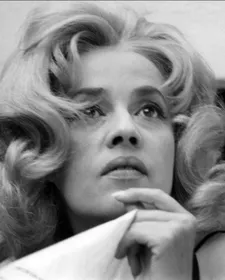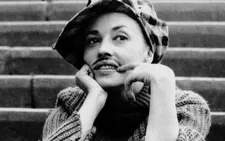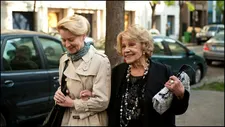| |
| Jeanne Moreau: 'The privilege of age is that I have more confidence and I am calmer. I know more about myself, I feel less egocentric' Photo: Unifrance |
Marcello Mastroianni who appeared with Jeanne Moreau in Michelangelo Antonioni's La Notte claims to have fallen in love with her at first sight.
“And she loves you in return,” he explained, “but just till the end of the film. She is always searching for love, and she leaves victims along the roadside."
Moreau, who has died in Paris aged 89, had a chequered history with the men in her life, including The Exorcist director William Friedkin whom she briefly married. She had a son Jerome, a painter, by a previous marriage to director Jean-Louis Richard. And she was linked to actors Lee Marvin and George Hamilton.
 |
| Jeanne Moreau: 'Sleeping with people is one of the best ways of getting to know them' Photo: Unifrance |
She was not the obvious femme fatale although an essential accessory, a cigarette, was never far from her lips. One critic suggested that “her lips are too thick, her nose is not straight, her ears are too small and her legs are too thin." Even the “unglamorous” Moreau admitted on one occasion: “Actors told me I was ugly."
Moreau loved creating waves. She once said: "Sleeping with people is one of the best ways of getting to know them.”
She took a firmly feminist stance. "Women used to be bred by their mothers to give in to men - it was the conspiracy of the kitchen. Now men are on the run, frightened, concerned to show how virile and how masculine they are. Many of them are not the sort of men who can take love on. They're too busy, too involved, their private life just has to go by the board.
"I have the strength to abandon a (sexual) situation. Men want to believe abandoned women have tears in their eyes. It frightens them to discover that a woman can pack up and go as easily as a man can."
Born on 23 January, 1926, Moreau’s mother was an English dancer from Oldham who came to work at the Folies Bergeres in Paris and her father earned a meagre living as a bartender. As a child, Jeanne lay in her bedroom listening to the soundtracks of the films playing at the cinema next door. Her younger sister, with whom she remained close, still lives in Brighton. Her younger sibling returned with their mother to Britain when she was 10, while Moreau stayed in France. If she had left too, she would have become English. "So many times I've thought how my life would have been different, and my work,” she once said.
During the Nazi occupation, Moreau was horrified when Jewish friends were forced to wear stars and protested by distributing Communist Party pamphlets. When she announced she wanted to be an actress, her father took a dim view and eventually the family split up.
 |
| Jeanne Moreau in one of her most celebrated roles in François Truffaut’s Jules Et Jim Photo: UniFrance |
Journalist Marianne Gray who wrote a biography of the actress, said after her difficult upbringing: "She felt that, in a way, she spent the rest of her life trying to learn how to build up trust and love for other people.”
Her career began on the stage at the Comedie Française and she acted in films from 1948 on. She was noticed by the young director Louis Malle, who cast her in Lift To The Scaffold and, more notably, Les Amants (The Lovers) in which Moreau played an upper-class housewife who finds salvation via sexuality.
In the Fifties, Moreau's performances helped launch many of the French New Wave of filmmakers. She starred in Francois Truffaut's classic Jules And Jim, where she played Catherine, who (in Gray's words) is "egocentric, unreliable and for the most part completely unaware of the torment through which she puts her men . . . she was the first truly ‘modern' screen woman, the first female free spirit we had seen on film." The film, noted Gray, was produced on a shoestring with no money for catering, so Moreau - who was quite a gourmet - cooked daily for the crew and cast of 22.
She worked with an amazing array of directors. The Trial (Orson Welles), Eva (Joseph Losey), Peau de Banane/Banana Peel (Max Ophuls), La Notte (Michelangelo Antonioni), La Baie des Anges/Bay Of Angels (Jacaques Demy), Moderato Cantabile/Seven Days...Seven Nights (Peter Brook), Diary Of A Chambermaid (Luis Bunuel), The Sailor From Gibraltar (Tony Richardson), and Querelle (Rainer Werner Fassbinder). She won the best actress award at Cannes in 1960 for Moderato Cantabile. Malle engineered the unlikely teaming of Moreau with Brigitte Bardot for the comedy adventure in Mexico Viva Maria in 1965 in which they were described as France’s most famous and beautiful bombshells."
It was a large-scale epic but she preferred to work on productions where she knew everyone by name. Because of this she eschewed working a lot in the States and turned down such films as the Mrs Robinson part in The Graduate and the Nurse Ratched role in One Flew Over the Cuckoo's Nest.
As she matured, she happily played older women who romanced younger men, thereby breaking another perceived taboo. She also started directing films of her own, with some success. In 1976, Moreau wrote and directed Lumiere, which focused on four actresses. She also directed L'Adolescente in 1979, which won critical acclaim and in 1997, she directed a third film, Solstice.
 |
| Jeanne Moreau with Laine Mägi in one of her last screen roles A Lady in Paris (Une Estonienne à Paris), directed by Ilmar Raag in 2013 when Moreau was 84 Photo: Unifrance |
Several years ago, she won plaudits for playing a colourful artist in Laurent Heynemann's The Old Lady Who Walked In The Sea. And more recently there was Map Of The Human Heart (1992) and The Proprietor (1997). She struck up a close friendship with director Josée Dayan, who directed her in Cet Amour-Là (2001), a portrait of a celebrated love affair between legendary novelist, scriptwriter, and film director Marguerite Duras and Yann Andrea, a man who is almost half Duras' age. She was still working at the age of 84 when she played Frida in A Lady In Paris, a grande dame living in an elegant apartment who has to work out a way of getting on with Anne (Laine Magi), an Estonian divorcee, who has been hired to be her carer.
I met Moreau briefly in Paris at the beginning of the Nineties when I asked her to become an honorary Patron of the French Film Festival UK. Despite her fearsome reputation she agreed graciously and for the next few editions she sent warm messages of support.
She embraced her advancing years saying: "The privilege of age is that I have more confidence and I am calmer. I know more about myself, I feel less egocentric. Anyway, in France you can still be a woman when you're 60 or 65. We replace youth with charm and savoir faire ... Glamour can be very constraining.”
Her motto had always been: "The life you had is nothing. It is the life you have that is important”, which makes a perfect epitaph.
See our gallery of Jeanne Moreau - A life in pictures





















